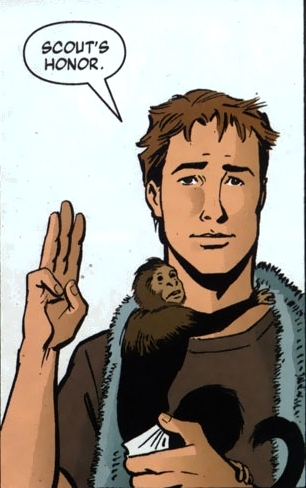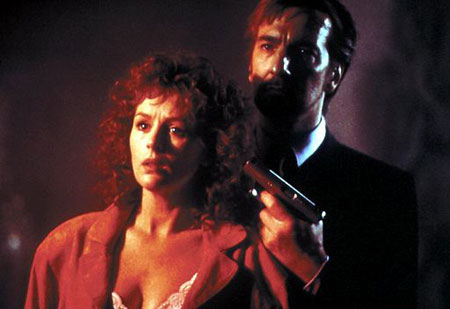Die Hard (1988) presents itself as a movie sympathetic to feminism. The protagonist, John McClane (Bruce Willis), is estranged from his wife, Holly (Bonnie Bedelia) essentially because she moved to Los Angeles to take a high-powered corporate job. John, a New York cop, can’t handle her success. The film takes care to show that John’s attitude is ridiculous and stupid — John’s limo driver from the airport calls him on it; Holly handily wins their big onscreen argument which John assholishly starts; and even John himself admits that he’s in the wrong (“very mature, John,” he mutters out loud to himself after Holly stomps out the door.) Throughout the film, Holly is shown to be a competent and successful manager, and it is never suggested that she should, or will, give up her career for her husband.
Moreover, Die Hard goes out of its way to ridicule and reject machismo. During the terrorist/hostage standoff that takes up most of the film, the cops and FBI continually act like impulsive dicks — much the way, in fact, we first see John acting in his argument with Holly. The cops and feds all are much more interested in being, as John terms them, “macho assholes” — swaggering around at the top of the pecking order, impressing their male compadres, and kicking terrorist butt. The parodically homosocial FBI agents Agent Johnson and Agent Johnson let out adolescent yawps as they fly around in their helicopter, boasting to each other how they can “live with” 25% hostage casualties. Their cockiness is presented as both idiocy and sin, and the film gleefully executes them for it. McClane survives precisely because he’s more cautious and more intelligent; a feminized action-hero who constantly exhorts himself to “think! think!” before unleashing the inevitable uber-violence.
But despite the critique of traditional action-hero masculinity, Die Hard is in the end extremely ambivalent about the idea of autonomous women. Holly wins the argument with John — but the result of that victory is not that John acquiesces. Instead, the result is that Holly and all her coworkers are immediately captured and held hostage, allowing John to cast aside the role of idiotic, defeated husband, and adopt the much more congenial and testosterone-fueled persona of heroic savior.
Coincidentally, as the plot unfolds, all those against whom John might be presumed to harbor a grudge are systematically and efficiently punished. Holly’s coworkers, of course, are all terrorized. More particularly, Holly’s Japanese boss Mr. Takagi — a fatherly executive whose warmth, manners, and calm all contrast painfully with McClane’s bad temper and working-class manners — is shot through the head by the terrorists. Later, a slick coke-snorting dealmaker who had earlier hit on Holly is similarly dispatched. The terrorists are then, not so much John’s enemies as they are his avatars — the catspaws which eliminate the other men in Holly’s life so that McClane can sweep her off to renewed bliss at the end of the film.
 In the way that its feminist trappings concealing male apocalyptic fantasies, Die Hard reminded me strongly of Brian K. Vaughn and Pia Guerra’s “Y: The Last Man.” In that series, too, a relationship crisis (in this case Yorick’s breakup with his girlfriend) is interrupted by unexpected violence which eliminates potential rivals (in this case a sudden disease which kills *all* rivals, as all men on earth but Yorick keel over.) And, like Die Hard, “Y: The Last Man” presents itself as feminist while actually treating the egalitarian relationships, with the concomitant possibility of rejection, as an occasion for anxious and protracted male posturing of a very familiar kind.
In the way that its feminist trappings concealing male apocalyptic fantasies, Die Hard reminded me strongly of Brian K. Vaughn and Pia Guerra’s “Y: The Last Man.” In that series, too, a relationship crisis (in this case Yorick’s breakup with his girlfriend) is interrupted by unexpected violence which eliminates potential rivals (in this case a sudden disease which kills *all* rivals, as all men on earth but Yorick keel over.) And, like Die Hard, “Y: The Last Man” presents itself as feminist while actually treating the egalitarian relationships, with the concomitant possibility of rejection, as an occasion for anxious and protracted male posturing of a very familiar kind.
I go back and forth on whether I prefer Die Hard or Y. On the one hand, Y is clearly a lot smarter about gender politics; on the other hand, I find the straightforward male violence of Die Hard a good bit less off-putting than the SNAG self-pity that permeates Y, especially at the end. In either case, though, I think the parallels between them are pretty telling. Men, it seems, in different mediums and over several decades, have a tendency to turn feminism into a male growth experience. With guns. Or, in other words, don’t trust the patriarchs, even when they say they love you.


Leaving aside their respective ideological content — a hard thing to do around here, I know! — do you still go back and forth between them? For mine, there’s no competition; it’s Die Hard by a mile. At least it’s entertaining and skilfully made, which I don’t think can be said for Y.
I can’t really leave aside the content, alas.
Die Hard is skillfully made and mostly entertaining…but it has it’s moments of pure shit, too. The cop with the tragic backstory who transcends his fears is really unforgivable, for example.
I found Y entertaining, and I think some of the characterization was smart and subtle, which is not something I can exactly say for Die Hard. Sooo…yeah, I find them comparable in quality, I think — both mediocre, though fitfully enjoyable if you don’t think about them too hard.
I’ve never stepped back to analyze “Die Hard,” but after reading your essay, I’ve given it some thought. I’m not sure I agree that the film knocks off John McClane’s “rivals” so Holly and her husband can get back together in the end.
I think the most important conclusion the film tries to make is that because there are ruthless people in the world, violence is sometimes a necessary defensive response, but not reckless, purely testosterone-driven violence.
McClane is depicted as a throwback cop thrust into a situation where his “uncivilized” cop skills are necessary to stand up to a ruthless group of killers.
And who is the hero at the end? An L.A. cop, Sgt. Al Powell, who has vowed never to pull his gun out of a holster again, has to pull it out and shoot the last remaining terrorist.
Measured, but reluctant response.
In a roundabout sort of way, the basic plot of “Die Hard” was lifted for the 1993 film, “Demolition Man.” In that story, the future world is so civilized that barbaric behavior is a thing of the past. But when a ruthless killer suddenly emerges and begins to run rampant in a now weak and helpless society, an equally barbaric counterforce from the past has to be revived to combat it. John Spartan is thus “Demolition Man’s” version of John McClane.
I like “Die Hard” a helluva lot better though.
I’d say that you’re reading is probably much closer to what the filmmakers intended. I’m arguing that there’s some emotional energy in the film that does some things that aren’t quite acnowledged.
In any case, I don’t think the two readings are mutually exclusive.
True.
One thing I found curious about the film even at the time it was initially released were the three main black characters.
As you pointed out, the film very much incorporated a positive progressive viewpoint of changing gender roles of that era. It attempted the same thing (successfully, I think) with two of the three black characters. One, Sgt Al Powell, was the pragmatic, intelligent, reluctant hero; and the other was a technical genius, and arguably the smartest terrorist. However, the third black character, the limo driver, was an odd racial caricature that seemed to be a carry-over from the 1970s — ala Huggy Bear from “Starsky and Hutch.”
I’m not kidding when I say the guy made me wince a time or two when I first saw the film because he seemed so out of place. I had a similar reaction when I first saw Jar-Jar Binks. WI mean, what the hell were they thinking?
Good call on the limo driver; that was a mistake.
I found the Powell painful to watch too, though not because of racial stereotyping. His tragic backstory and redemption were just so pat it made me gag.
Given the importance of second-degree in Hollywood movies, I wonder how much of Powell’s “redemption” is more subtle humour than cheesy drama.
The movie is over in terms of suspense, and then a blond giant comes out screaming from under the rubble to be killed by the gun-hating cop in an act of self’s-new-friend’s-defense.
It feels to me like you’re supposed to laugh at this.
I’d say it’s both. Cheesy laugh and cheesy feel good apotheosis for the character.
Don’t remember “Die Hard” too well, and have no interest whatsoever in reading “Y: The Last Man.”
But I don’t have any trouble accepting the premises Noah holds forth. Because “have your cake and eat it too” approaches (i.e., a Violence is Awful theme while showing violence as exciting, cool, and Solving Problems) are hardly a rare happenstance in commercial entertainments.
And then, there’s the “cater to your target audience” factor; surely mostly teenage boys in the case of “Y,” male action-movie buffs for “Die Hard” (who would like to think of themselves as smarter and more sensitive than a caveman, yet able to Kick Butt and Rescue the Girl when needed to), with in the latter case a nod made to the girlfriends they bring to the theater…
————————
Noah Berlatsky says:
Men, it seems, in different mediums and over several decades, have a tendency to turn feminism into a male growth experience…
————————–
Like movies on the the Civil Rights movement tend to star white folks, with “a tendency to turn Civil Rights into a white person’s growth experience…”